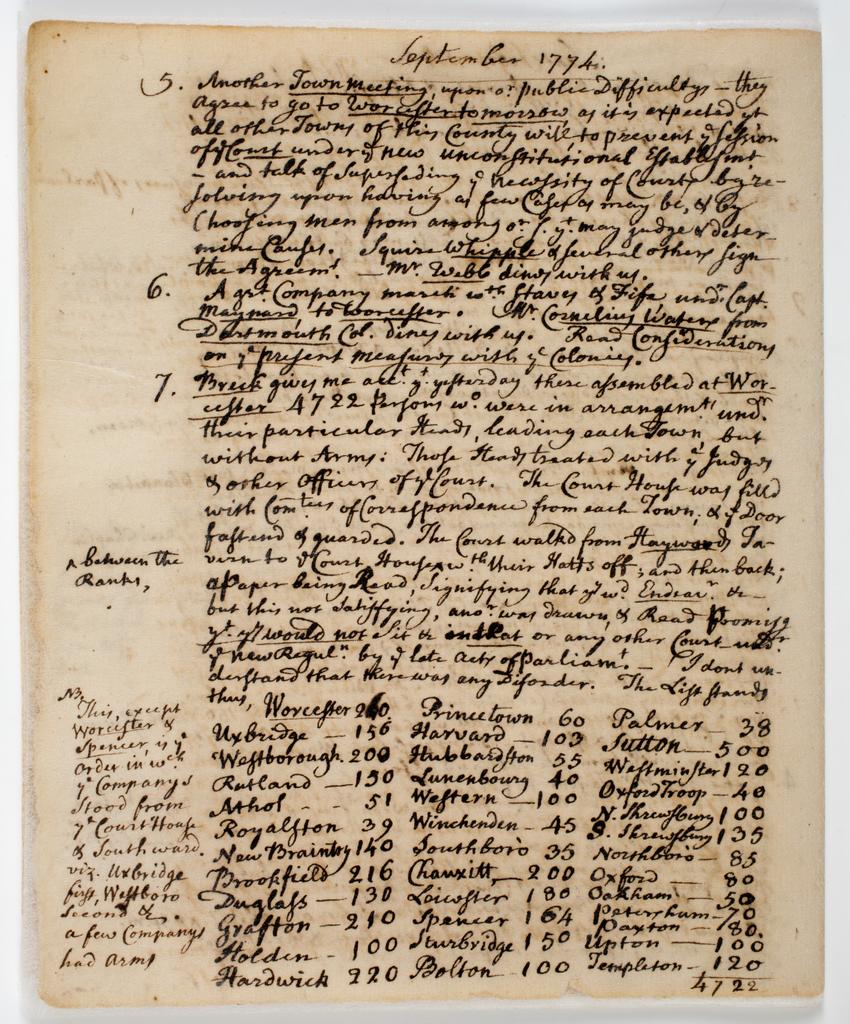From mid-August to early October, 1774, huge crowds gathered in the “shiretowns” of every county in contiguous, mainland Massachusetts (except Suffolk, where Boston is located) to shut down the courts. These courts, which served executive as well as judicial functions, were the farthest outreach of Crown authority. People at the time offered estimates of the crowd numbers: 1,500 in Great Barrington (Berkshire County), 3,000 to 4,000 in Springfield (Hampshire County), 4,000 in Plymouth (Plymouth County), and so on.
In only one case do we have a more precise count. On September 6, in Worcester, a militiaman from Westborough, Breck Parkman, went through the ranks to gather numbers from each of the participating 37 militia companies. He showed these to his father, Ebenezer Parkman, who entered them into his diary, which is housed at the American Antiquarian Society in Worcester. From the note in the margin, we even learn the order in which these companies lined up on Main Street to witness the recantation of court officials. Although some of the numbers appear to be rounded off, this is by far the most accurate measure of the size of the crowds. The total is striking: approximately half the adult male population of this sprawling rural county showed up that day. (Note that Ebenezer’s addition is incorrect—the numbers Breck gave him total 4,622, not 4,722.)
Below is an image from Parkman’s diary with entries for September 5, 6 and 7. Click the image to enlarge.










2 Comments
Interesting account of the summer of ’74, coming only short time after the implementation of the Coercive acts in June. Courts were the honey to the rebel bees throughout these times, as well as during the unrest of Shays’s Rebellion in 1786-1787 where the disruption of legal proceedings was the next best thing to armed resistance.
On Sept. 2, three days before Parkman’s first listed entry, this from Gen. Thomas Gage to Lord Dartmouth:
I came here to attend the superior court, and with the intention to send a body of troops to Worcester, to protect the court there; and if wanted, to send parties to the houses of the councilors who dwell in that country; but finding, from undoubted authority, that the flames of sedition had spread universally throughout the country, beyond conception; the councilors already driven away; and that no court would proceed on business; I waited the event of the sitting of the superior court here … the judges met, but could get neither grand nor petit jury.
The Journals of Each Provincial Congress of Massachusetts in 1774 and 1775 (Boston: Dutton and Wentworth, 1838), 634-635.
Flames of sedition, indeed!!!
Funny, I was just in the American Antiquarian Society Reading Room yesterday. Should have read this article first. : )